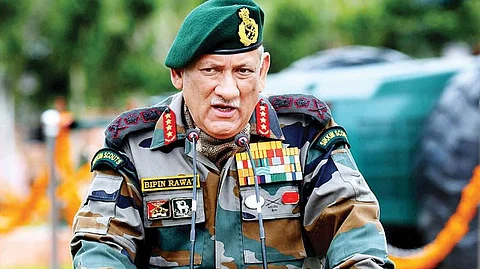
- Home
- Live Blog
- Breaking News
- Top Headlines
- Cities
- NE News
- Sentinel Media
- Sports
- Education
- Jobs

With the appointment of outgoing Army Chief General Bipin Rawat as the country’s first Chief of Defence Staff, the hierarchy of India’s defence leadership has entered a new era. Taking over in the first-ever new post, General Rawat has already come out with a broad outline of not just his new assignment, but also of the new office that has been created by the BJP-led government at the Centre. As he has said in his first statement on assuming office, the CDS has a task to cut out: To make all three services work in a cohesive manner. The three services will now work as team towards a goal where 1+1+1 is either five or seven, and not three.
As General Rawat also put it in his typical military-style, the synergised effort should not be the sum of the whole, but it should be much more, which will be achieved through integration. The CDS will also have to focus on better utilization of resources and joint training, General Rawat has said. As Chief of Defence Staff, General Rawat will be the principal military adviser to the Defence Minister on all matters related to the three services. Security experts meanwhile have said that the most important challenge for the country’s first Chief of Defence Staff will be to integrate the armed forces into the government edifice to enable them to participate fully in the decision-making process relating to all kinds of defence-related matters. Another vital responsibility would be to facilitate the restructuring of military commands for optimal utilization of resources by bringing about jointness in operations, including through establishment of joint/theatre commands. Apart from giving attention to integration and joint training, to ensure uniformity and integrity of systems for procurement, so that the Army, the Navy and the Air Force can work in coordination with each other.
Experts also point out that the CDS will handle all tri-Service issues and push for “greater jointness” among the three forces which often pull in different directions due to the absence of any Inter-Service prioritization to systematically build the country’s military capabilities within the existing budgetary constraints. While the idea of creation of such a post goes back to as early the time of Lord Mountbatten, it was General KV Krishna Rao who had in 1982 made the first proposal to the government to create such a post. Seventeen years later, it was the Kargil Review Committee headed by retired IAS officer K Subrahmanyam which strongly recommended creation of the CDS post in 1999, followed by the Group of Ministers recommendation in 2001. While it was gathering dust for several years, the Naresh Chandra Task Force of 2012 and the Lt Gen DB Shekatkar Committee of 2016 too reiterated the need for creation of the CDS office. The intention of the government was finally made public by Prime Minister Narendra Modi in the course of his Independence Day speech on August 15, 2019.
A little over four months later, the Cabinet Committee on Security formally announced creation of the new post, a four-star General who will be Chief of all the three forces. Military experts have meanwhile stated that the Government of India has finally realized that the country requires a Chief of Defence Staff as a critical position in today’s era of hybrid warfare that will help increase jointmanship, tri-service effectiveness and overall combat capabilities of India. Significantly, though India has been constantly engaged in some kind of military conflict with Pakistan since Independence, as also occasional frictions with China, it was, till Tuesday India was the only large democracy which did not have a single point military advisor. More importantly, all P5 countries – the UN Security Council’s five permanent members (the P5), namely China, France, Russia, the United Kingdom, and the United States – have their respective Chief of Defence Staff. Right now, as the country’s first CDS has taken over, the eyes of the whole world, particularly of Pakistan and China, are fixed on India.